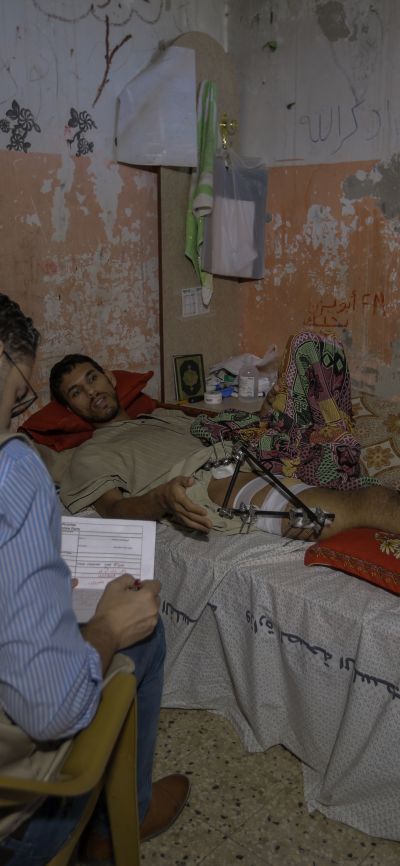Gaza: « I can’t hold my kids like before »
HI is treating hundreds of victims of violence in Gaza. Discover the daily challenges faced by the injured and their families.

Mohammed and his two children in their home in Gaza, June 2018 | © Hardy Skills / HI
Injury
"I felt like I had been electrocuted, my leg bulged and then I lost consciousness".
Mohamed was shot in the leg during incidents at the Gaza border on 6 April, 2018. At least 15,000 people have been injured since violence worsened in March, with approximately 3,000 suffering from severe lower leg trauma similar to Mohammed’s.
"I am bedridden now, I can't hold my kids like before and I am always frightened to move”
Mohammed has since undergone two major surgeries and now has a large metal frame around his leg. He will need further bone reconstruction surgery in the coming months but this is a specialist procedure that can only be carried out in hospitals outside of Gaza. It is not clear whether he will be allowed to leave.
Consequences
"I don't have this amount of money, my family is poor, we can't afford it for long"
Mohammed lives in Gaza with his wife, two children and members of his extended family. He used to bring in a small but essential income delivering vegetables at the market but is now unable to work. He is currently paying 45 euros a week for painkillers as well as costs for transport to hospital.

A member of the HI mobile team assesses Mohammed’s needs, June 2018 © Hardy Skills/HI
HI’s Support
"I used to love playing football in my neighborhood, but now I can only hope to start using my crutches as soon as possible"
Mohammed is visited at home by HI staff who are providing post-operative care, including wound dressing. They aim to improve his living conditions – by providing a mattress to prevent bedsores, for example - and physiotherapists will start a physical rehabilitation plan when his condition improves. They stress that this will take many months of hard work and patience. During this time, psychologists, specially trained by HI, will also help Mohammed to deal with the psychological and social impact of his injuries.
Future
"Before the injury, I was hoping to have my own private house for my small family. Now, I just hope to find a way to make my kids happy"
Mohammed is determined to recover but will need sustained medical and psychological support if he is to avoid developing a permanent disability. HI’s mobile team of specialist nurses, physios and psychologists, will accompany him throughout his journey, giving him the very best chance of a full recovery.
HI’s Emergency Activities in Gaza
• HI and its local partners have set up 12 mobile teams. These teams include rehabilitation professionals, psychologists and social workers. They visit the injured in their homes as there is not enough space in hospitals and to ease the burden of travel costs.
• As of 5th July, 2018, the mobile teams have assessed and begun providing services (physiotherapy, post-operative care, psychosocial support, assistive devices) for 661 injured patients and will reach hundreds more in the coming weeks.
• The mobile teams were specially trained by HI in 2017 in order to prepare for this kind of emergency situation.
• HI also prepared contingency stocks in each governorate, including mobility aids (crutches and wheelchairs), emergency wound management, kitchen kits, and information for carers, which have reduced waiting times for these resources.




